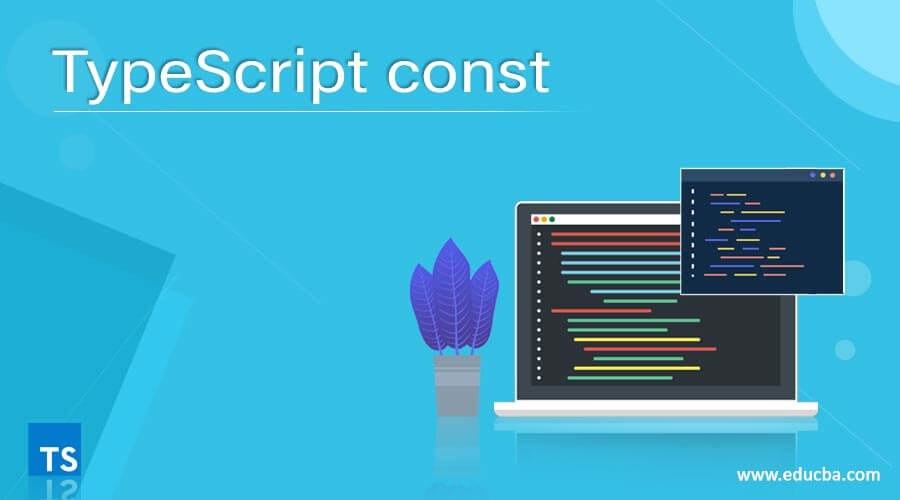Updated April 6, 2023
Introduction to TypeScript const
TypeScript const is one of the ways of declaring variables. The keyword ‘const’ makes the variable a constant, which means the variable’s value can not be changed. There are many other ways of declaring variables using ‘let’, ‘var’, etc. As ‘var’ allows to declare variables the same as JavaScript, it has the same scoping rules as that in JavaScript. While the ‘let’ keyword was introduced in ES6 along with the ‘const’ keyword, ‘let’ declares block-scoped local variables initializing to a value optionally. But in some cases, we do not want to block scope but also want immutable variables. Hence, with this limitation in the ‘let’ keyword, we are using the ‘const’ keyword for immutable variables.
Syntax:
Given below is the syntax of TypeScript const:
const <constant_name> = <value>It is a normal variable declaration but with the keyword ‘const.
Rules and Regulations for const Keyword
We shall look into some of the rules for declaring variables using the const keyword.
- Const variables make a variable constant and cannot be changed.
- Before declaring a const variable, users should make sure that the variable would not be reset.
- An immutable variable is an approach that gives fewer bugs.
- Const keyword declares block-scoped variables with any constant value.
- Const has the same scoping rules that of the ‘let’ keyword.
- If the user knows before hand that the variable declaring will not be reassigned, then it would be better to declare using const keyword instead of let and var keyword.
- Const declaration provides a read-only reference to the value, which does not mean the value the const keyword is holding is immutable but can not be reassigned.
- Const keyword can not be accessed before initialization which results in Reference Error.
- Const can not be redeclared, which throws an Uncaught Syntax Error.
Sample declaration of const variables:
const sample_emp = "Karthik";Examples of TypeScript const
Given below are the examples of TypeScript const:
Example #1
TypeScript const declaration.
Code:
const sample_emp="Karthik";
console.log('here is the employee name', sample_emp);Output:
So here, we are only declaring a const variable and initializing it to a string value.
Now, we will see various errors with these const declarations.
Example #2
TypeScript const, the const variable cannot be reassigned.
Code:
const Employee = {
empName: "Karthik",
empID: 10,
empLob: "RCL"
};
Employee = {
empName: "Daniel",
empID: 11,
empLob: "INS"
};
Employee.empName = "Saideep";
console.log('Employee Name: ', Employee.empName)
Employee.empID = 14;
console.log('Employee ID: ', Employee.empID)
Employee.empLob = "IVS";
console.log('Employee Lob: ', Employee.empLob)Output:
There will be no output as this code will give an Error as ‘Cannot assign to ‘Employee’ as it is a constant.’
Example #3
TypeScript const must be initialized.
Code:
const EmpName;
const EmpId = 45;
EmpId = 89;Output:
There will be no particular output as the above code will throw an Error as ‘const declarations must be initialized’. & ‘Variable EmpId has implicitly ‘any’ type’. Also, we are reassigning EmpId to another value, so that too will throw us an error.
Example #4
TypeScript const being a block-scoped variable.
Code:
const stuName = "Ravi Kumar";
if (true) {
const stuName = "Ravi Kiran";
console.log('Student Name: ', stuName);
}Output:
The same const variable we are declaring and initializing with a new value, this does not give us any error as it is taken as a new variable and is only limited to the if block.
Example #5
TypeScript const for Deep immutability.
Code:
const student = { stuName: "Jaanu", stuId: 567, stuCtgry: "RCL" };
student.stuName = "Jahnavi"
student.stuId = 345
student.stuCtgry = "INS"
console.log('Student Name', student.stuName);
console.log('Student ID', student.stuId);
console.log('Student Category', student.stuCtgry);Output:
So here we see that student const has object literals, and we are reassigning the object literals and not the const value. Hence const keyword supports sub-properties of objects to be mutated.
Example #6
TypeScript const Read-only reference to a value.
Code:
const student = { stuid:101, stuname:"Tushar"}
student = {stuid:102, stuname:"Ramkiran"}
console.log('here are the student details', student.stuid, student.stuname);Output:
Here we will not get an output as the above code gives us an Error ‘Cannot assign to ‘student’ because it is a constant.’
The const here creates a Read-Only Reference to the value. The user can not change the reference as it is immutable. But user can change the value of the properties the const holds. The user can not assign a new object but can change the properties of the object.
Example #7
TypeScript const ‘Accessing before a declaration’.
Code:
console.log(Fruits);
const Fruits = { fruitName1: "Orange", fruitName2: "Apple", fruitName3: "Grapes" };
console.log('Fruits', Fruits);Output:
There will be no output as the above code will give an error as ‘Variable ‘Fruits’ is used before assigning’ & ‘Block Scoped variable ‘Fruits’ used before its declaration’.
We are trying to access the const before initialization which results in Reference Error.
Conclusion
With this, we shall conclude our topic ‘TypeScript const’. We have seen what is TypeScript const and how is it used. Looked into its syntax declaration and initialization with few examples. Most of the Errors we face with this small keyword ‘const’ are also shown. Most of the developers recommend using const to declare variables. Const is mostly for block-scoped variables and immutable variables. We have also listed out few rules for TypeScript const on the declaration, its usage and its limitations. Only references are immutable for const objects.
Recommended Articles
We hope that this EDUCBA information on “TypeScript const” was beneficial to you. You can view EDUCBA’s recommended articles for more information.






